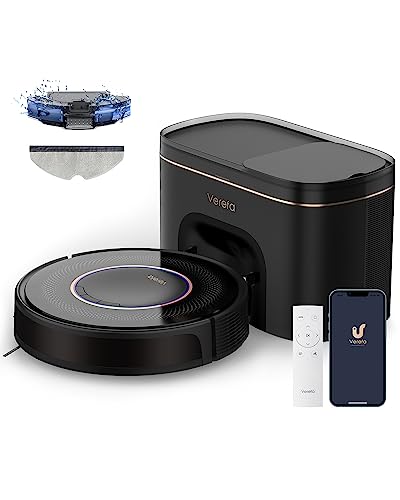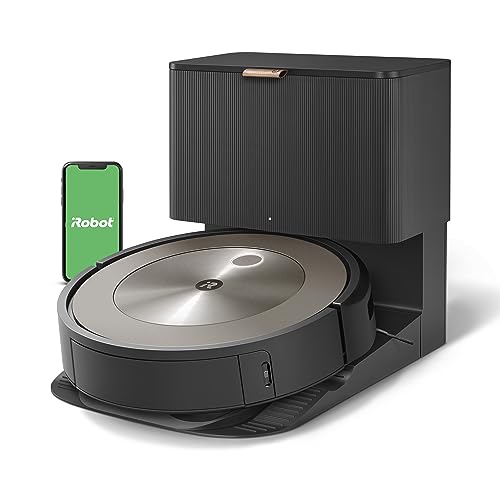It Is The History Of Self Emptying Robot Vacuum In 10 Milestones
페이지 정보
작성자 Brodie 작성일24-09-09 03:08 조회62회 댓글0건관련링크
본문
 The Convenience of a Self Emptying Robot Vacuum
The Convenience of a Self Emptying Robot VacuumA self emptying robot vacuum will move debris into a larger storage bin inside its docking station, instead of releasing it in the air. This could be a big issue for those with allergies.
 If you live in a big house, choose one with long runtime. Also, ensure that the dust bin can be returned to its original location for charging during cleaning sessions. You'll also want to think about app integration that lets you set no-go zones as well as alter settings such as suction power.
If you live in a big house, choose one with long runtime. Also, ensure that the dust bin can be returned to its original location for charging during cleaning sessions. You'll also want to think about app integration that lets you set no-go zones as well as alter settings such as suction power.1. Less Icky
One of the major drawbacks of standard robotic vacs is that they often have tiny dustbins that require manual emptying after every few cleaning sessions. This can be a hassle particularly if someone in your household suffers from allergies: the emptying of the tiny dustbin usually results in a haze of noxious debris being thrown up into the air. Self-emptying robot vacuums address this issue by letting the device automatically dump its collection container into a larger, external bin. This allows the dream of an automated household closer to reality.
Generally, self-emptying robots have a dock that is specially designed to is not only charged but also connects to a series of vacuums that pull dirt and debris from the collection container and place it in a large container. When the canister is empty, the robot will return to its dock and empty its contents. It will then move to another area in the house to tidy. This process is less annoying than emptying the onboard dustbin and is also much easier to accomplish since you won't be inhaling the particles that are released into the air when it occurs.
The disadvantage of the self-emptying system is that it adds to the cost of a robotic vacuum. It is important to keep this in mind when choosing the right model to meet your needs. You should also ensure that the canister size is big enough for the frequency of cleaning you want and the size of your home.
A self empty robot vacuum and mop-emptying robot vacuum isn't essential for everyone, but it can be an absolute lifesaver for those suffering from allergies and busy families that are looking to cut down on time and get rid of the hassle of emptying a dustbin. It's a great solution for those with large houses that are too big to be covered by a single machine.
Many self-emptying robots are designed to make life easier and come with features like app control and scheduling capabilities, mapping technology mop/vacuum switch features, and more. They can also be connected to your Wi-Fi and smart home devices, allowing you to control them even when you're away from home.
2. Less Wastage
The tiny robots that shuffle around your home and suck up dirt and pet hair can be wonderful, but their small dustbins require regular emptying. They can also get tangled up in stray items like stray shoelaces as well as phone chargers and pet toys or snagged on the thresholds of doors and thick carpets.
Self-emptying models provide a solution to the dustbin issue with the tiny robot vacuums. The vacs will automatically return to their original location when the canister gets full and empty out all that dirty debris with a loud squeak into a bin that houses an empty paper vacuum bag. The vac then resumes its pre-programmed cleaning routine.
These models can also tell when the battery is depleted. They can stop the cleaning process and return back to the base to charge and resume the cleaning process when the battery is fully recharged. If you're looking for more hands-free convenience, choose a battery that is programmable to automatically empty the battery at specific intervals (like every three months).
They're still more expensive than standard robot vacuums however they're a good investment for homes with certain needs, particularly for those suffering from allergies or other respiratory issues. They're designed to capture a much larger amount of dust hair, pet hair and other allergens than conventional vacs, which means they can reduce symptoms.
The latest robotic vacuums employ smart technology to map your entire house prior to every cleaning session. This makes them more efficient than older models. They can also create "no go" zones that are able to avoid certain areas, such as a rug or a child's toy. Some allow you to schedule cleaning times each day, every week or when you're away. Some have the ability to control the remote and have voice assistants for additional convenience. They are ideal for busy families who want to enjoy a cleaner and healthier home without having to spend all their time doing chores.
3. A Shorter Time
A best self emptying robot vacuum for pet hair-emptying robot vacuum takes one of the biggest lengthy steps out of the process. They automatically transfer waste out of their onboard bin to a larger bin at their base station when they detect it is full. This eliminates the need to stop cleaning sessions in order to empty the bin, and makes them less of a burden for busy individuals, especially those with mobility issues.
To test a robot's capability to move debris from the dustbin on board We added a weighted amount of dry debris and determined the percentage of debris that fell into the receptacle of the charging dock. In our tests, models that moved a greater percentage of the dry debris to the dustbin bag for charging or bin earned a higher score.
This is especially beneficial for busy families or those who have mobility issues, since it eliminates the need to pause cleaning to empty and open the onboard dustbin. If you want to keep track of your robot's progress, some models can be connected to voice assistants like Alexa or Google Home so that you can control them via just a few commands. You can also set up no-go zones as well as check the robot's performance. You can also modify settings and schedule cleaning sessions.
While a best self emptying robot vacuum for hardwood floors-emptying vacuum may be more user-friendly however, it is louder than conventional vacuums. This is an important aspect to consider if you're sensitive to noise. If you're worried about noise levels, look for a robot with an 'In-Situ' Mode or try scheduling your cleaning sessions to be done when you're away from the home.
They are also less time-consuming to use as a result. This means that you are able to use them more frequently which will help keep your floors cleaner for longer.
4. Spend Less Money
The self-emptying robot vacuum is an excellent feature that enhances compatible models of robot vacuums. It makes it less necessary to empty the bin on the robot, which can be messy and time consuming. It makes it easier to utilize a robot vacuum in larger homes in which you will need to use it more frequently.
Self-emptying robots tend to be a little more expensive than other types of robots. This is because they often come with a more complicated system to store and manage the dirt and waste they accumulate. Some robots come with a hopper that automatically dumps the debris collected into the bin. The capacity is typically about 2.5-3 litres. You'll only have empty the bin after two or three cleaning cycles. This could save you a lot of time and effort over the life of the robot.
The most sophisticated of the self-emptying robots also can create an accurate map of your home that allows you to label rooms and define virtual no-go zones. Some models can be controlled via voice assistants like Alexa. They're not inexpensive however, with most expensive models costing more than $1000.
Although a robot vacuum that self-empties could help you save time, it is not completely foolproof. Even the most sophisticated best robot vacuum and mop self-empty vacuums may get stuck under furniture or on carpets that are thick, and get snagged up by phone chargers, cords, and pet toys. If this happens, it may require a thorough floor check before letting your robot go, or it may simply give up and send an SOS to you for help.
The other disadvantage of the self-emptying model is that it is an extremely heavy and bulky unit. This can make it difficult for robots to fit under furniture or in tight spaces. It can take up lots of space on your coffee table or kitchen counter, especially if it has an external bin with a capacity of up to six litres.
댓글목록
등록된 댓글이 없습니다.














